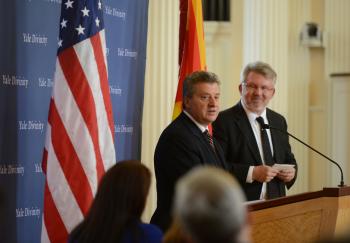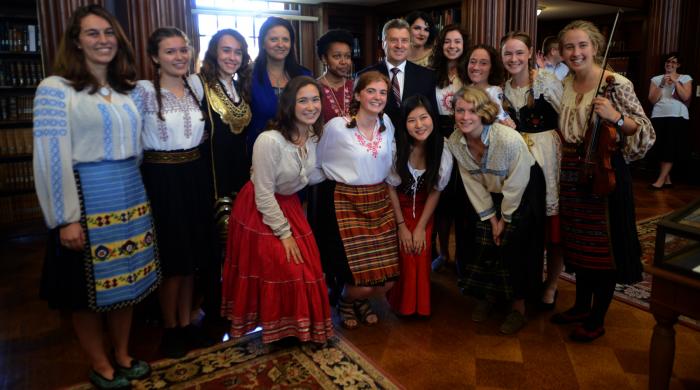On September 22, YDS welcomed President Gjorge Ivanov of the Republic of Macedonia to campus. President Ivanov delivered a lecture in Marquand Chapel entitled “The Macedonian Model of Coexistence,” which explained how his country managed a peaceful democratic transition following the dissolution of Yugoslavia.
 Before a crowd of students, faculty, staff, and members of the community, Dean Sterling introduced President Ivanov and welcomed his family to New Haven. Dean Sterling noted that the lecture was an opportunity to “celebrate the extraordinary series of events that has taken place in Macedonia over the last 20 years” and part of a continuing series of YDS-sponsored lectures given by heads of state addressing the role of religion in reconciling and building bridges rather than a source of violence and exclusivity.
Before a crowd of students, faculty, staff, and members of the community, Dean Sterling introduced President Ivanov and welcomed his family to New Haven. Dean Sterling noted that the lecture was an opportunity to “celebrate the extraordinary series of events that has taken place in Macedonia over the last 20 years” and part of a continuing series of YDS-sponsored lectures given by heads of state addressing the role of religion in reconciling and building bridges rather than a source of violence and exclusivity.
“These lectures are intended to cultivate strategies of how religion can foment resolutions and not polarize society,” Sterling said.
In his remarks, President Ivanov described Macedonia’s model of coexistence as “integration without assimilation.”
“We have never practiced just tolerance,” explained President Ivanov, speaking in Macedonian with an English translator. “We practice respect. We have never assimilated diversity.”
President Ivanov began with a brief history of the Balkans, emphasizing how the rise and fall of empire and religion continues to shape the region. Tracing this history back to the Byzantine and Ottoman empires, the president remarked that his country developed a model of coexistence with a particularistic view, in which identity did not depend on religion.
Referencing Henry B. Wright Professor of Systematic Theology Miroslav Volf’s award-winning book, Exclusion and Embrace (Abingdon, 1996), President Ivanov emphasized the importance of preserving and respecting diversity.
“There is no tolerance if there is no ‘other,’” said President Ivanov. “Tolerance is possible only when there is a balance between belonging and distancing.”
President Ivanov is a leading expert on civil society, specializing in political management. He began his professional career as a journalist, becoming an editor at the national broadcasting station. He later taught political theory and philosophy at the Iustinianus Primus Faculty of Law in Skopje. During the Yugoslav era, he became involved with youth activism, advocating for political pluralism and free market economy. He was first elected president in 2009 and is currently serving his second term. His presidency has been distinguished for its progressiveness—EU and NATO membership, economic recovery—and inter-ethnic relations, particularly in its sensitivity to regional relations with Greece.
Despite the successes of this Macedonian model, President Ivanov acknowledged that coexistence is, at times, tenuous. Citing the 2001 conflict between the government and the ethnic Albanian insurgents that ended with NATO intervention, the president noted that his country continues to wrestle with the clash of ethnic identities
“Reality is dynamic and complex, and Macedonia is part of that view,” said President Ivanov.
Following the lecture, a reception was held in the Day Missions Reading Room of the YDS library. The Yale Slavic Chorus, the university’s oldest all-women vocal ensemble, gave a short concert in honor of President Ivanov and his family. The chorus has a history of playing music from Bulgaria, Croatia, Macedonia, Russia, and Ukraine. In the spirit of their tradition, the group wore traditional Slavic costumes and sung four Macedonian folklore songs. During their last song, President Ivanov, his wife, Dean Sterling, YDS students, and members of President Ivanov’s security team joined the women ensemble in a traditional Macedonian dance.
Members of the YDS community expressed their appreciation for the opportunity to hear President Ivanov’s perspective on religion’s role in fostering coexistence.
“As an international student from Jamaica in divinity school, it [the lecture and reception] gives me a different perspective,” said Kirkland Williams ’16 M.A.R. “It shows what’s true about religious communities, that they are diverse and can use their differences to transform society.”
Andrew Harkness ‘16 M.A.R. expressed his eagerness to explore more about the process of conflict resolution while at the divinity school.
“It’s interesting how a nation can focus on respect as a way to resolve differences,” said Harkness. “I felt challenged by President Ivanov’s comments that ‘he who communicates, integrates.’
President Ivanov is in the country attending the annual world leader’s summit at the United Nations in New York City.
